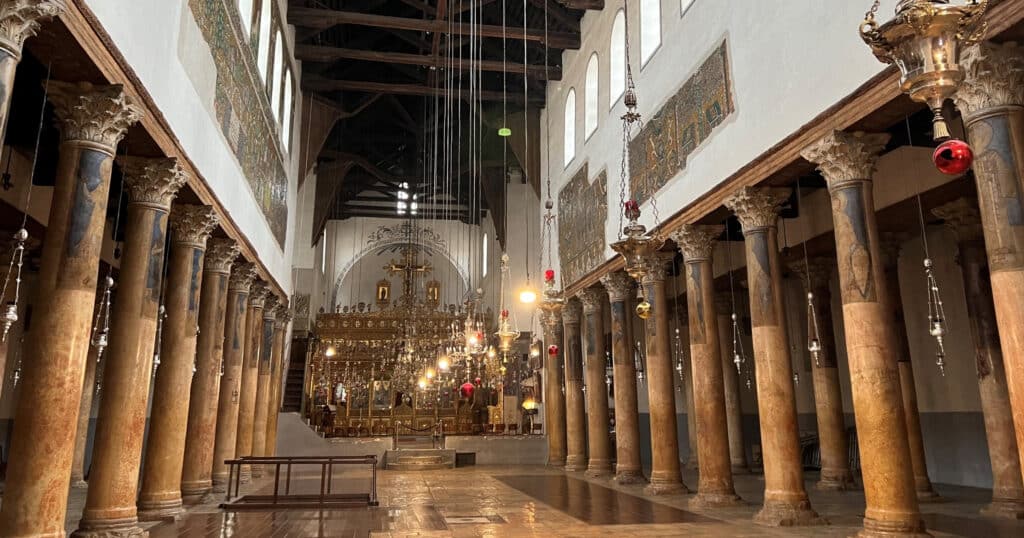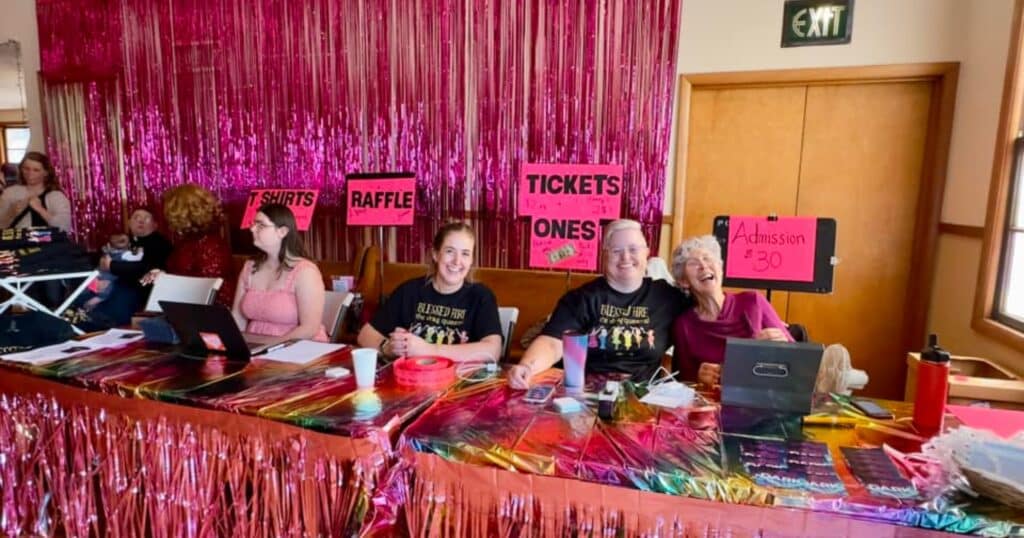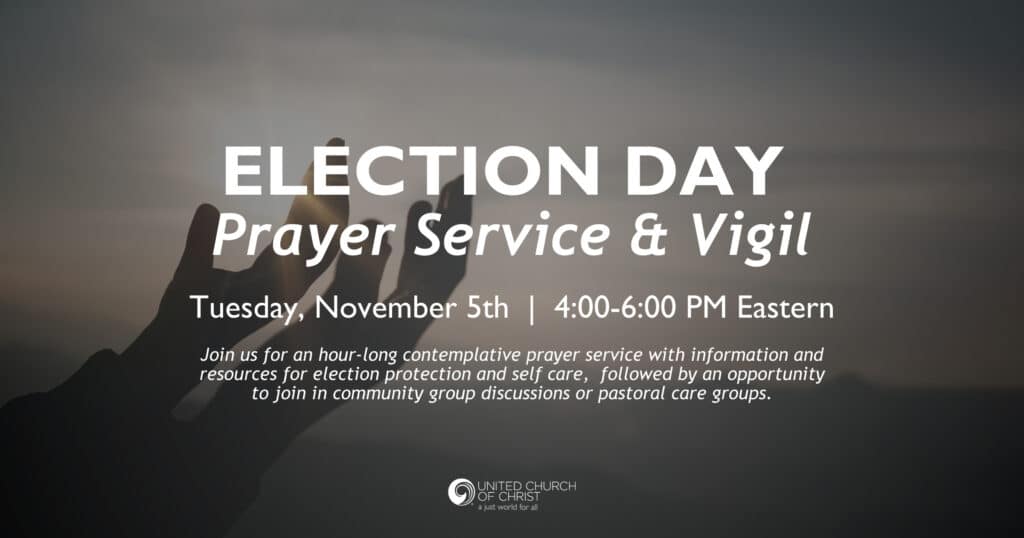Commentary: Pastor experienced ‘radical hospitality’ fleeing West Bank when violence broke out
The Rev. Linda Noonan was part of a delegation from the United States visiting Israel/Palestine with Community Peacemaker Teams – Palestine beginning Sept. 27. The group was in the West Bank city of Hebron when Hamas launched the “Al-Aqsa Flood” against Israel.
I walked toward the soldiers and their raised guns guarding the closed checkpoint in front of their armored vehicle, holding out my US passport like some kind of white flag. My friend and pastoral colleague, Amy Yoder-McGloughlin, was at my side, having led our delegation to the occupied West Bank of Palestine to work with Community Peacemaker Teams for the last two weeks. She also held her passport high. Our three American traveling companions waited just out of sight in a van behind us with Boulos, our Palestinian friend committed to seeing us to safety, collectively holding their breath.
“We are Americans. Please let us pass.”
The checkpoint was closed, as were all other checkpoints at that moment in the country. We were trying to leave Bethlehem, having been stranded there after our Palestinian Muslim friends in Hebron had risked so much to spirit us out of the Old City as soon as news of the “Al Aqsa Storm” in Gaza broke.
They knew that the occupied area in which we had been staying would be intensely vulnerable given the heavy military and Zionist settler presence. Indeed, within hours after we left, soldiers shot a boy in the same street we had just passed, the city shut down completely and settler and military violence escalated.
‘Radical hospitality’
Intending to make a run for Jerusalem where we assumed we could fly out of Tel Aviv early, we found ourselves – like Mary and Joseph so long before us – not able to get any further than Bethlehem. All roads leading out of the West Bank were closed. There, a Christian family who runs the “House of Peace” hostel opened their doors and extended the radical hospitality that is such a deep part of Palestinian culture. Turns out there was “room at the inn” after all. At night, we tried to sleep as Israeli fighter jets headed to Gaza less than 45 miles away, roared over our heads.
We waited in Bethlehem for two days, hearing stories from distressed shopkeepers about food and gas being cut off to the West Bank. Sitting in the parlor with our host family in the evening, we watched the live coverage of the bombings in horror as they offered us hot, sweet tea and hazelnut biscuits.
Manger Square, the large worn stone plaza outside the Church of the Nativity, normally packed with Christian pilgrims from around the world, stood empty. It must be a rare thing to have the entire historic landmark to oneself, but the next morning I did. I prayed for peace in that silent, cavernous, ornate place – ironically the birthplace of one who came to bring peace.
After some time, I was approached by a Palestinian asking if I needed help. Matheos is a mechanical engineer who found himself needing to support his family by providing tours in Bethlehem. He invited me to coffee, and we sat in the shadow of the church in the empty stone square, sharing stories.
‘Nowhere was safe’
Later that afternoon, Boulos urged us to leave immediately. There was no guarantee that either of two checkpoints in and out of Bethlehem would be open, but violence was erupting all over the West Bank in retaliation for the now-full-scale war in Gaza and nowhere was safe. He loaded us up in his van and set off to find us a way out.
It took hours, a trip to the first checkpoint which was unattended but physically barricaded, information-sharing and impassioned arguments among the local taxi drivers about what else might be possible, before Boulos led us back to his van.
Driving around Bethlehem as he tried to assess our options, Christian music played over his speakers. As we approached the only remaining checkpoint and our last hope to get home, the popular contemporary Christian song, “Waymaker,” came over the speakers. Normally that kind of music makes me cringe. But this time it felt downright spooky. And right on time.
I sat in the back seat of the van, thinking about my faith tradition and that of my Jewish and Muslim siblings – stories of a God who makes a way out of no way. The Exodus, wilderness-wanderings and manna, seas parting, wells springing up in the desert, and the narrow places.
‘Way-makers’
In the distance we could see the checkpoint at the top of the hill. There was fencing and a rock and dirt mound-like barricade about four feet high stretching from one side of the street to the other. Amy and I got out, passports in hand and walked toward the soldiers.
Call it faith. Call it the strong prayers of thousands of people who have been holding us up in their churches and synagogues and mosques, in their Bible studies and staff meetings, in their noonday calls-to-worship, and in their hearts. Call it the invisibility and perceived powerlessness of two aging women. Call it whiteness. Definitely, call it whiteness. Or call it the privilege that comes with being able to brandish a United States passport as someone who is technically a settler on unceded Indigenous land myself.
But the soldiers let us through. We threw our packs over the dirt hill, scrambling over and sliding through the rubble, down the other side, walking toward the grey Volkswagen van making its way toward us.
It was just one of a hundred instances in which Palestinians organized, networked, sacrificed, risked their own safety and very lives, offered us hospitality and sweetness and gave of themselves so that we might make it home.
They have been the true way-makers. And in this time when so many of our beloved friends and family members and people with whom we feel joined by spirit or tradition or blood or justice are now trying to find a way to safety or awaiting the violence that is coming their way, I don’t know what to do but honor them by telling stories of what I have seen. And grieve. And pray.
The Rev. Linda Noonan serves as pastor of Saint Paul’s United Church of Christ in Exton, Pa.
Content on ucc.org is copyrighted by the National Setting of the United Church of Christ and may be only shared according to the guidelines outlined here.
Related News
‘Blessed Are the Drag Queens’: Oregon church event celebrates love and acceptance
Amid harmful anti-trans and nonbinary legislation and political messaging, Bridgeport United...
Read MoreUCC to offer Election Day Prayer Service and Vigil
On Election Day, Nov. 5, join the Rev. Karen Georgia A. Thompson together with United Church...
Read MoreGoing beyond the blessing: Churches emulate St. Francis’ care for animals
https://www.youtube.com/watch?v=lu3LYwhLxCo UCC News presents a video news story on the...
Read More


